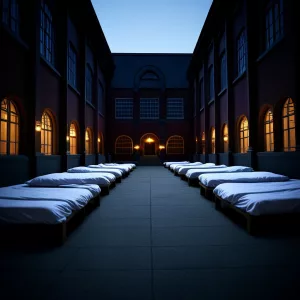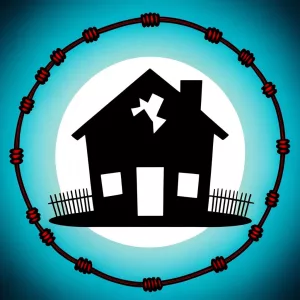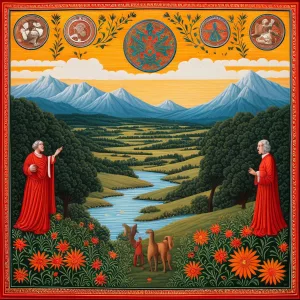Parliamentary committees, especially the Portfolio Committee on Communications and Digital Technologies, are vital in fighting misinformation and improving digital access. They check government efforts to ensure everyone has equal opportunities, especially in education and social welfare. This week, the committee is examining how to tackle false information and connect schools to the internet, which is crucial for students’ futures. They also focus on making social grants safer and more efficient for those in need. Overall, their work aims to create a fairer society where everyone can thrive in the digital age.
Kudakwashe Mpofu’s arrest has uncovered deep corruption in South Africa’s hiring process. His use of fake documents to get a highpaying job has sparked anger and concern among citizens, who feel that unfair practices block qualified locals from getting jobs. This situation shows how favoritism and dishonesty have crept into both public and private hiring, eroding trust in the system. Many are calling for big changes to ensure that hiring is fair and based on talent, not connections or corruption, to create a brighter future for the country.
The unrest at the University of Cape Town (UCT) is a loud cry for help from students facing tough challenges. They are blocked from registering due to fee issues and struggle to find housing, leaving many without a place to stay. The protests, led by the Economic Freedom Fighters Students’ Command (EFFSC), highlight the deep inequalities in South Africa. Students are demanding change, hoping UCT will listen and act on their needs for a fair education. Their fight echoes past movements, showing the power of unity in seeking justice and equality.
Muhsin Hendricks was a brave imam and activist who fought for LGBTQ+ acceptance in Islam, making history as the first imam to openly share his homosexuality. He created The Inner Circle, which offered support and understanding to those struggling with their faith and identity. Tragically, he was killed in a violent attack while officiating a wedding that showcased love and inclusivity. His life was a powerful reminder of the courage needed to challenge norms and advocate for a world where everyone is accepted, leaving behind a legacy of hope and compassion. Hendricks inspires us to embrace our differences and work towards a kinder, more inclusive future.
South Africa’s journey after apartheid began with hope, shining brightly with Nelson Mandela’s leadership and the rise of the ANC. However, challenges like corruption, especially during Jacob Zuma’s time as president, have darkened that bright path. Mac Maharaj, a key voice in the antiapartheid movement, warns that the country needs to focus on rebuilding trust and accountability within the ANC. He urges young people to take charge and help shape a better future, reminding everyone that the past’s lessons are crucial for a brighter tomorrow. The heart of South Africa’s story is about facing challenges headon and dreaming of a united and just nation.
South African universities are facing a serious student housing crisis, leaving many students without safe places to live. Problems arise from not enough accommodation, poor management, and issues with financial aid systems like NSFAS. Protests have erupted on campuses, as students demand better living conditions and question the promises made to them. With clashes between students and authorities, the situation has become desperate, highlighting a need for urgent change. Organizations are stepping in to help, but the struggles reflect deeper issues of fairness and access in education.
In her powerful speech, Minister Thembi Simelane shines a light on South Africa’s journey toward a fairer future. She talks about fixing old wrongs from the past, like land dispossession, and emphasizes the importance of providing homes for all, especially for firsttime buyers and students. Simelane highlights the government’s plans to build more houses and support military veterans, showing a commitment to empower every community. With a strong focus on justice and growth, her words inspire hope for a brighter tomorrow in South Africa.
PEPFAR is like a lifeline for South Africa, helping to fight HIV and tuberculosis (TB). It provides crucial funding and employs over 15,000 health workers, making it easier for people to get the treatment they need. But now, cuts to this aid are putting many lives at risk, especially for vulnerable groups like drug users and sex workers. With less support, these communities may struggle to access vital care, which could lead to more infections and serious health problems. South African health organizations are now reaching out for help from businesses and individuals to fill the gaps and keep these important services running.
The State of the Nation Address (SONA) in South Africa is a key moment for the country, where leaders reflect on successes and challenges, while outlining future plans. Minister Ramokgopa emphasizes the importance of unity and economic growth, calling for everyone to work together for a brighter future. He recalls the Freedom Charter, a historic document promoting equality, as a guiding light for collaboration among different political groups. Addressing the economy, he sets ambitious growth goals and focuses on improving infrastructure to boost development. Overall, Ramokgopa’s message is one of hope and determination, urging South Africans to stand united for progress.
The legacy of forced removals in South Africa, especially during apartheid, leaves deep wounds in the nation’s heart. Communities like Sophiatown were torn apart, leading to economic struggles for the displaced. As South Africa works towards healing, it aims for justice and equality for all its people. With a commitment to combating corruption and protecting the vulnerable, the country moves forward, determined to create a brighter, united future where everyone can thrive.
In South Africa, the important tradition of initiation is in danger due to tragic events that have happened during ceremonies. Many boys have faced serious health issues, leading to a call for changes to make these rites safer. Key reforms include holding leaders responsible for safety, providing resources for monitoring, and educating communities about safe practices. Empowering traditional leaders, known as amakhosi, is crucial to ensure these ceremonies honor their cultural significance while protecting the boys involved. Together, everyone hopes to create a safer and more joyful experience for young initiates.
In his powerful speech, President Ramaphosa called for all South Africans to come together and work towards a better future. He highlighted the importance of listening to different voices and addressing past wrongs, especially about land reform. The President also shared exciting plans for rebuilding communities, boosting the economy, and embracing new technology. With a focus on unity and progress, he painted a hopeful picture of a resilient South Africa ready to face its challenges and thrive together.
The South African Social Relief of Distress (SRD) grant is a vital lifeline for people facing tough times, especially during crises. Managed by SASSA, this financial aid helps millions and has recently been extended until 2025. A recent court ruling could open the doors for even more people to access this important support, despite SASSA’s worries about costs. However, the application process can be tricky, especially for those without internet access, but SASSA provides options to help everyone apply. Ultimately, the SRD grant reflects a commitment to helping those in need and fighting against poverty in South Africa.
Cape Town is a flavorful paradise, especially when it comes to its famous fish and chips. This beloved dish shines in various spots, from the stylish SeaBreeze Fish & Shell to the cozy Fish on the Rocks, each offering a taste of local culture. Whether you’re enjoying a chic meal with ocean views or savoring simple, fresh bites at Kalky’s, every place tells a story of the city’s rich culinary heritage. Cape Town truly invites everyone to experience its vibrant food scene, where tradition meets modern creativity in every delicious bite.
From February 18 to 20, 2025, the City’s Water and Sanitation Directorate will pause water supply in Hout Bay and along Govan Mbeki Drive for important maintenance. This work is vital for creating a strong and sustainable water system, helping to prevent future issues. Residents are encouraged to store water in clean containers to prepare for the temporary outages. While the work may cause some inconvenience, it represents a smart step towards better water management and community resilience, ensuring that the city’s lifeblood flows smoothly for everyone.
Cape Town is on a mission to change how people get around the city, focusing on safer and greener travel options. The plan includes building better sidewalks, bike lanes, and features that help everyone, including those with disabilities, move easily. This exciting project invites residents to share their thoughts and ideas, ensuring that the changes meet community needs. As Cape Town embraces this vision for sustainable transport, it aims to create a healthier, more connected, and vibrant place for all its people.
















